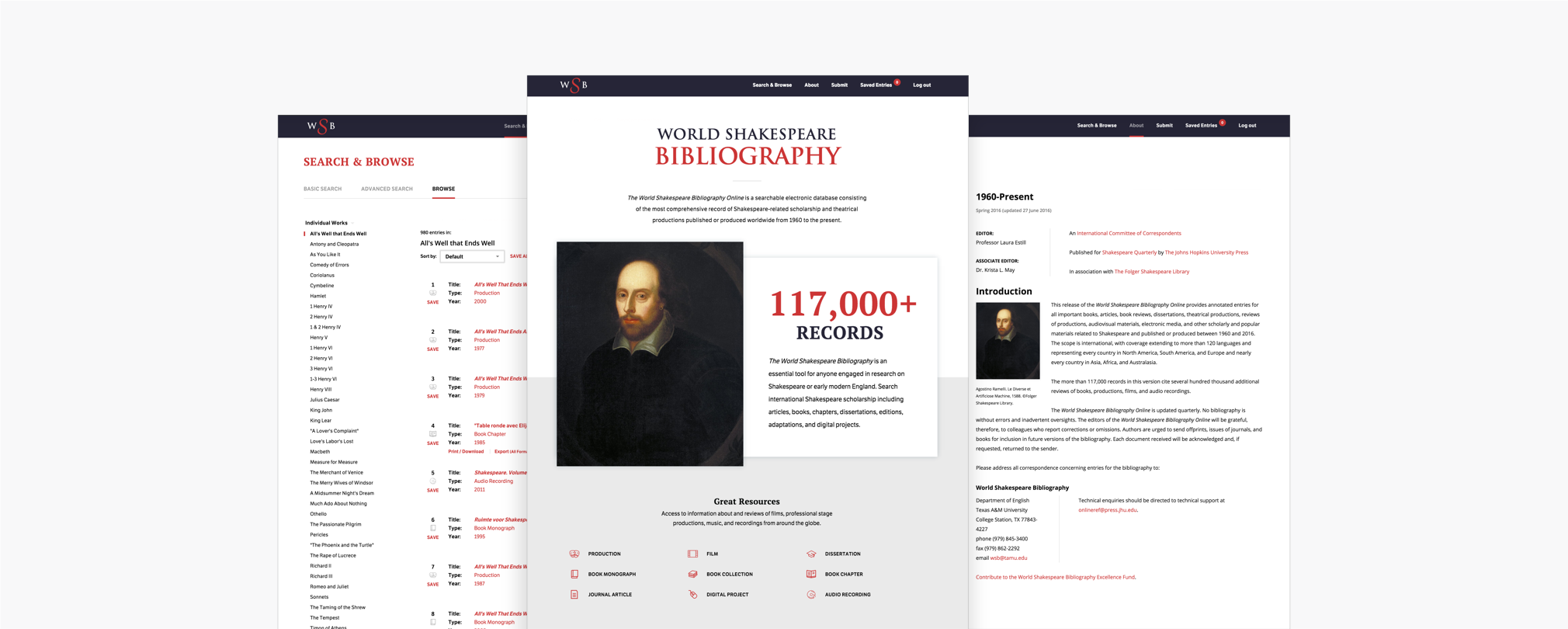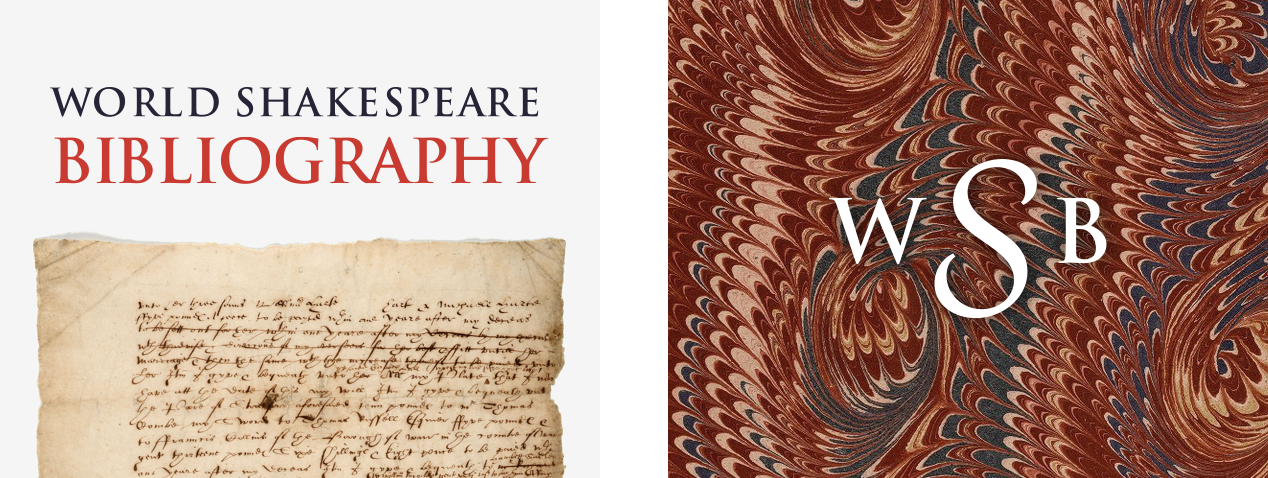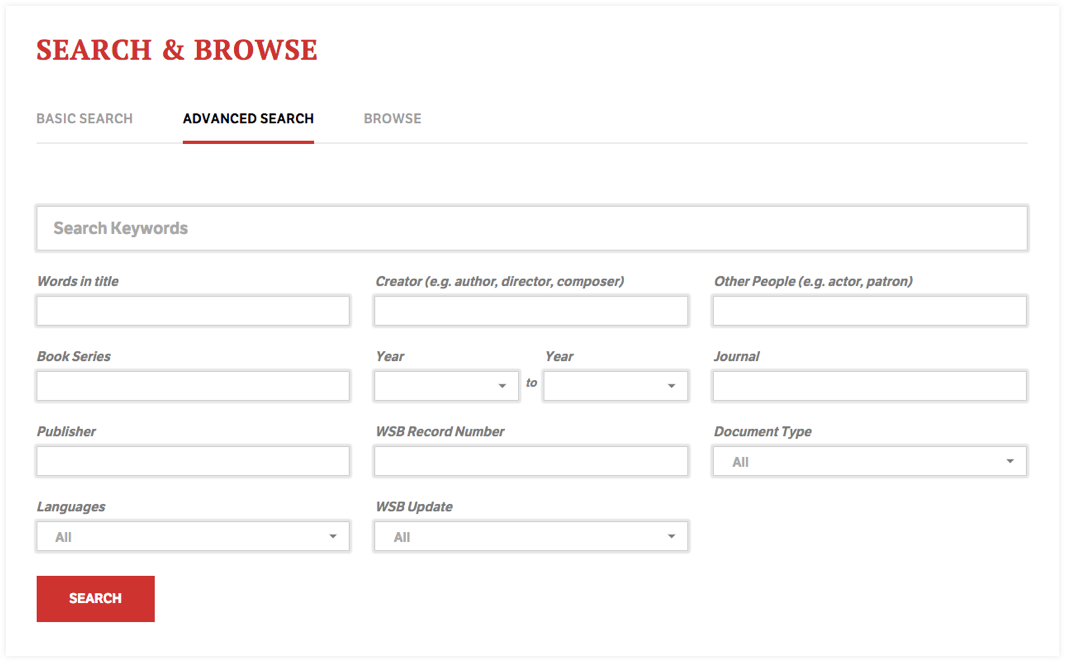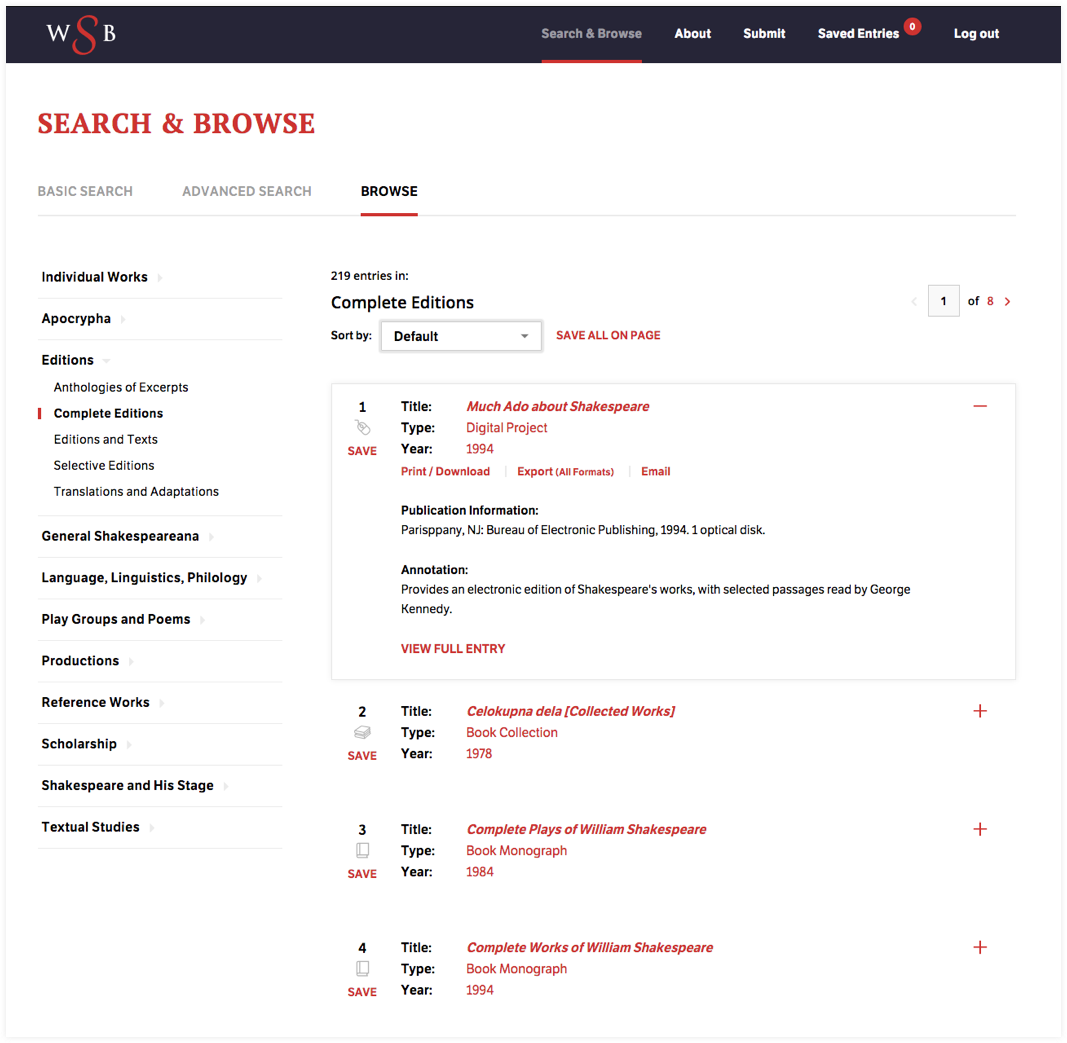The Most Comprehensive Collection of Shakespeare Data, World Wide.
In a continuation of the relationship between the Folger Shakespeare Library and the Web Development Group (WDG), the World Shakespeare Bibliography (WSB) site was designed and developed to provide a comprehensive, searchable electronic database of William Shakespeare and related works and documents.
The Most Comprehensive Record of Shakespeare Data, Worldwide
The World Shakespeare Bibliography is a joint collaboration between Texas A&M University, John Hopkins University and The Folger Shakespeare Library. It is the largest database of Shakespeare-related material produced worldwide, ranging from 1960 to the present. The database includes books, articles, dissertations, stage productions, book reviews, films, stage adaptations and more. At first glance, the WSB site may appear as a simple searchable catalog site, but behind the scenes, WDG was tasked with creating a complex search portal that houses over a quarter of a million records.


Appealing to Academics
The first challenge presented was creating a site that successfully performed all the required search capabilities while appealing aesthetically to an academic audience. The WSB site is subscription based, comprised of individual subscribers and educational institutions. To facilitate an academic user experience, WDG’s expert branding specialists and design authorities offered logo exploration and design, as well as the design of a streamlined and succinct navigation. The colors and imagery coordinate with the Folger Shakespeare Library website, while still creating a unique identity and experience. Beyond the look and feel, the Drupal development specialists at WDG were challenged with creating complex technical capabilities to allow for extremely filtered and advanced searches, and data-focused usability.
Facilitating Complex Search
To facilitate a site with such heavy search needs, Drupal was selected as the open-source Content Management System (CMS). The Web Development Group selected Drupal as the CMS for the website because it offers powerful search capabilities, and the additional module options for expanding the search process are robust. Drupal’s inherent search functionality is advanced by default, but when coupled with applications such as Solr, WDG development experts were able to create a customized search implementation and configuration with many filters for data funneling, offering the user powerful and multifaceted browse and search functionalities that could support huge amounts of records while creating an intuitive experience.
The customized Solr integration indexes nearly 40 different fields and exposes 11 different filters to users. Site users can search by keywords and phrases, but may also use wildcards and boolean operators (and, or, not) to construct advanced queries. In addition, results contain embedded links to cross-references, book collections, and further filters for related records.

Expanding the Search Experience
Implementing and configuring a custom Solr search was just the beginning, as users needed to do more than just view a list of results. WDG built a saved entry interface for micro-bookmarking results returned to build a virtual bibliography and enabled users to export to a variety of tools. WDG’s development team implemented export formats for email, print, plain text download, and an export compatible with bibliographic software. This allowed users to import the records returned on World Shakespeare Bibliography to the popular software Zotero, RefWorks and EndNote.
Additionally, WDG implementation authorities built SFX link generation into entry results. SFX links are used among institutions to locate physical copies of data, like journal articles, books, etc. so scholars can find and reference physical works. The SFX results are filtered by distance and availability. WDG implemented this capability by marrying OpenURL and SFX link resolvers, so the user sees results relevant to them.
Beyond the impressive search development, design aspects were also accounted for in the presentation of results. To help facilitate a comprehensive display, custom icons were designed to correspond with the various formats of work, such as film, books, stage productions, and so forth. Having a visual representation assists in the organization of results for the site viewer. Additionally, to help streamline the display of results and prevent content clutter, several supplementary user interface elements were designed. Expandable/collapsible dropdowns reveal or minimize additional content information, allowing the user to attain more details of a specific search results, without having to click all the way into it. Hover effects were also utilized; when the cursor is placed over a specific search result, additional save/share options are uncovered.

Data Migration is Key
The next challenge presented to The Web Development Group was the migration of 117,000 data entries and an equal number of reviews to the new WSB site. As recognized experts in data migration, WDG was apt at delivering a pragmatic approach to this deliverable. As with any site, data migration is finicky in nature, but for the WSB site, precise and accurate migration was essential. Because the site’s main functionality is browsing and searching, with the availability of complex filtering and funneling, if data were migrated incorrectly, search results would be incorrect and inaccurate. You can read further about data migration in our Expert Insights.

Creating a New Workflow
Another business goal emphasized by WSB was a site that was easy to maintain and update. In response, WDG created a completely new, user-friendly system for data entry. WSB is backed by vetted users and members who are able to create and submit new entries; entries are then examined by the editor, a member of the editorial staff, or a member of the committee of correspondents before being integrated into the site’s database. Additionally, editors regularly update and submit corrections for works. Enhancing this process was a huge component of the workflow. Formally, WSB had two systems in place: one for inputting data, and one for displaying it. The Web Development Group upgraded this system and created a new, streamlined workflow and approval process by merging the two systems. Doing so not only accelerated the data entry process, but it also improved the accuracy of data categorizing and tagging.
Supporting the Open-Source Community
While designing and developing the World Shakespeare Bibliography, the WDG implementation team submitted bug reports and found solutions for two separate Drupal modules. As active users and supporters of open source technology such as Drupal, WDG takes responsibility for fueling the development of this community and takes an active part in improving upon such technologies.
About The Web Development Group
At WDG, we deliver results-driven and engaging device-independent online web properties and communities. While our strategy and design teams are platform agnostic, our web development team specializes in open-source technologies, such as Drupal and WordPress.
Our clients range from successful startups and Fortune 1000 brands to higher education institutions and nonprofit organizations and we thrive on building long term partnerships with our clients. In addition to World Shakespeare Bibliography and Folger.edu, we have collaborated with The Folger Shakespeare Library on several other projects, including, Shakespeare Documented, The Wonder of Will, The First Folio Exhibition Tour, as well as several digital applications geared towards different exhibits and display platforms.